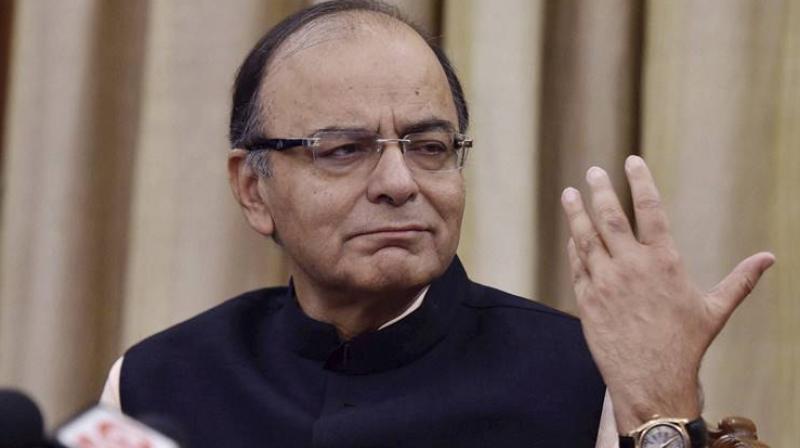Jaitley hits back at Rahul: Rafale deal under BJP 20 pc cheaper than UPA's
On Rahul's assertion that demonetisation was done to help Modi's 'crony capitalist friends', Jaitley said, 'Little knowledge is dangerous'.

New Delhi: As the war of words over the Rafale deal escalated, Finance Minister Arun Jaitley on Thursday said that the fully weaponised fighter jets which his government is buying are 20 per cent cheaper than the ones offered under the previous UPA regime.
Minutes after Congress President Rahul Gandhi launched a no-holds-barred attack on Prime Minister Narendra Modi for allegedly helping only "15-20 crony capitalist friends", Jaitley took to the Twitter to say any diversionary tactic will not wipe out the falsehood of the opposition leader.
"@RahulGandhi has not read my question - The fully weaponised Rafale aircraft's 2016 price is 20 per cent cheaper than the 2007 offer. This is what the 2015 statement of the PM and the French President refers to as 'on terms better than the 2007 offers'," he wrote.
Arun Jaitley had on Wednesday posed 15 questions to Rahul Gandhi, charging him with "peddling untruth" and carrying out a "false campaign" on the Rafale deal in a bid to counter the opposition's charge of it being the "biggest scam" in the defence sector.
Read: Every word in Cong's allegation on Rafale pricing 'factually false': Jaitley
Rahul Gandhi at a press conference has maintained that the BJP government was buying fighter jets at more than three times the Rs 520 crore price, the previous UPA government had negotiated a deal to buy 126 medium multi-role combat aircraft. To this, Jaitley said, "Any issue diversion by @RahulGandhi on my Rafale questions, will not wipe out his falsehood on Rafale."
On Rahul Gandhi's assertion that demonetisation was done to help Modi's "crony capitalist friends", the Finance Minister said, "Little knowledge is dangerous. @RahulGandhi's fiction on 'demonetisation helping NPA holders', forgets that the Modi Government legislated and enforced the IBC where the NPA defaulters lost their companies." IBC is the Insolvency and Bankruptcy Code that calls for auctioning off the assets of serial loan defaulters. NPAs a non-performing assets refer to bad loans.
Also Read: Note ban wasn't mistake, but done to destroy poor: Rahul slams PM Modi
Earlier on Thursday, in a Facebook blog, Arun Jaitley said invalidation of non-deposited currency notes was not the only object behind the November 8, 2016 decision to junk Rs 500 and Rs 1,000 notes.
"The larger purpose of demonetisation was to move India from a tax non-compliant society to a compliant society. This necessarily involved the formalisation of the economy and a blow to the black money," he wrote achieved?
The comment came a day after the Reserve Bank of India (RBI) said that almost all of the Rs 500 and Rs 1,000 notes which were made illegal in November 2016 have returned to the banking system, prompting the Opposition to question the efficacy of demonetisation in curbing black money.
Arun Jaitley said that when cash is deposited in the banks, it losses anonymity and it can be identified with its owner.
"Accordingly, post demonetisation about 1.8 million depositors have been identified for this enquiry. Many of them are being fastened with tax and penalties. Mere deposit of cash in a bank does not lead to a presumption that it is tax paid money," he said.
He reeled out numbers to support his claim - number of income tax returns filed growing from 3.8 crore in March 2014 to 6.86 crore in 2017-18; number of new returns filed post demonetisation increased by 85.51 lakh and 1.07 crore in past two years; advance tax in first quarter of 2018-19 witnessing a rise of 44.1 per cent in personal income tax and 17.4 per cent in corporate tax category; and income tax collection increasing from Rs 6.38 lakh crore in 2013-14 to Rs 10.02 lakh crore in 2017-18.
"When the impact of demonetisation and other steps is analysed, the Income Tax returns have increased by 19 per cent and 25 per cent. This is a phenomenal increase," he said. "The growth of income tax collections in the pre-demonetisation two years was 6.6 per cent and 9 per cent. Post-demonetisation, the collections increased by 15 per cent and 18 per cent in the next two years. The same trend is visible in the third year."
This, he said, is the positive impact of demonetisation.
"More formalisation of the economy, more money in the system, higher tax revenue, higher expenditure, higher growth after first two quarters," he added.

